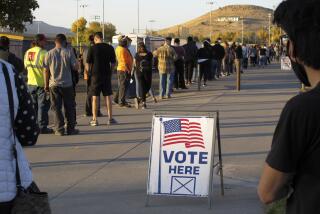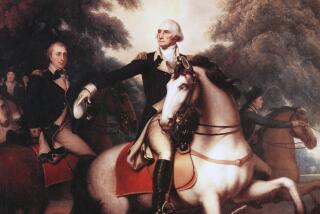Bill Would Do Holiday Right by George
- Share via
WASHINGTON — Monday is a holiday: Presidents Day, right?
Not in the future, though, if Rep. Roscoe G. Bartlett has his way.
The Maryland Republican has introduced a bill that would require federal agencies to refer to the third Monday in February as George Washington’s Birthday.
At one time, of course, the nation observed the first president’s birthday on Feb. 22, which is Washington’s actual birthday. (Oh, all right. He was born Feb. 11, 1731. But that was when the Julian calendar was in use. On the Gregorian calendar, adopted in 1752, the day falls on the 22nd.)
Then, in 1968, Congress changed the observance to the third Monday in February, making it the anchor of a three-day weekend.
Three years later, President Richard M. Nixon issued a proclamation that declared it Presidents Day--which gave a nod to Abraham Lincoln’s Feb. 12 birthday as well.
In Bartlett’s view, that was a particularly bad move.
“We’re not celebrating anything except another sale, another day you don’t go to work and another day the kids don’t go to school,” he said. “I never hear on Presidents Day any discussion of the virtues of any of our presidents.”
Take Washington’s legendary confession to his father that he could not tell a lie and had chopped down the cherry tree--a lesson, said the four-term congressman, that “obviously came to mind” given the presidency’s recent history.
The law making the third Monday in February the day to observe Washington’s birthday is still on the books. Most federal agencies refer to the holiday as Washington’s Birthday.
Bartlett’s bill, as well as a companion Senate measure sponsored by Sen. John W. Warner (R-Va.) is aimed at making sure every agency does.
If passed the law would not be binding on the states or private businesses, but then Congress can do only so much.
James C. Rees, executive director of the Mount Vernon Ladies’ Association, the nonprofit organization that has tended Washington’s historical legacy and Virginia plantation home since 1858, praised the idea.
Nixon’s Presidents Day proclamation was “a mistake that never should have been made,” Rees said.
“Why anyone would want to have taken a very meaningful holiday like George Washington’s Birthday and change it to Presidents Day never made any sense to me,” Rees said.
There’s a timeliness to the resurgent interest in Washington since the 200th anniversary of his death last year, he said.
With voters getting ready to select a new president, Rees sensed a yearning for a president like Washington, who at 23 was the highest-ranking officer from the American colonies in the French and Indian Wars and opposed the formation of the two-party system.
“I think character and leadership are definitely on people’s minds, and those are George Washington’s two strongest suits,” Rees said.
“Unfortunately, people look at the Gilbert Stuart portrait or the dollar bill, and he looks old, or disgruntled, or sedentary, if you will,” Rees said. “They don’t see he was the action hero of the 18th century.”
Bartlett limited his request for co-sponsors to lawmakers from the original 13 states. So far in the Senate, Warner has been joined by Charles S. Robb (D-Va.) and a handful of others.
“As the father of our country, President Washington deserves to be distinguished from other Presidents,” Warner wrote Jan. 27 in a “Dear Colleague” letter, quoting President James Buchanan, who once said, “When the birthday of Washington shall be forgotten, liberty will have perished from the Earth.”
--- UNPUBLISHED NOTE ---
The federal holiday popularly called “Presidents Day” is officially called “Washington’s Birthday.” The U.S. Office of Personnel Management says: “This holiday is designated as ‘Washington’s Birthday’ in section 6103(a) of title 5 of the United States Code, which is the law that specifies holidays for Federal employees. Though other institutions such as state and local governments and private businesses may use other names, it is our policy to always refer to holidays by the names designated in the law.” In addition, President Nixon never issued a proclamation declaring the holiday Presidents Day.
--- END NOTE ---
More to Read
Sign up for Essential California
The most important California stories and recommendations in your inbox every morning.
You may occasionally receive promotional content from the Los Angeles Times.













